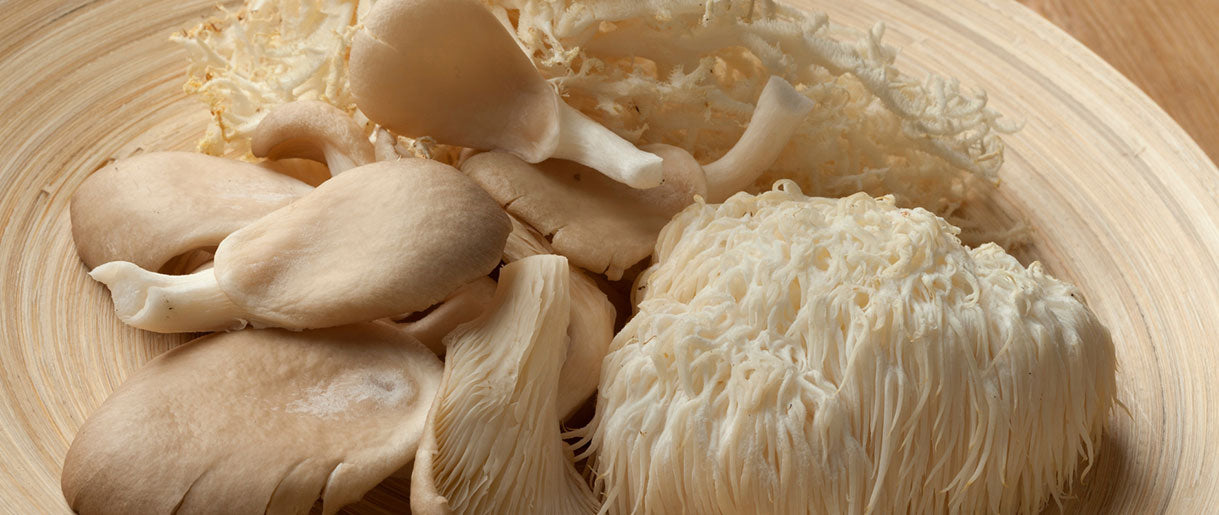There's a lot of talk these days about using medicinal mushrooms for good causes. Mushrooms contain a wealth of beneficial chemicals, many of which can be used to promote the health of various organs throughout the body. Some work on the immunological system, while others focus on the nervous system.
Are mushrooms nootropic? Mushrooms appear to be more than just a spore-bearing, fleshy, fruiting body of a fungus; but also a nootropic in their own right. More and more mushrooms are gaining traction in nootropic and brain research, with encouraging findings thus far.
These include Cordyceps, Chaga, and Lion's Mane, the most effective mushroom nootropic of them. The ability of these mushrooms to function "bidirectionally" is one of their distinguishing characteristics. This means that, depending on the situation, they can either stimulate or suppress psychological processes in the body.
This post discusses the best mushroom nootropics and why you may want to add them to your nootropic stack!
Understanding Nootropics

Nootropics can boost cognitive function and mental performance, including focus, memory, learning ability, and mood. They are sometimes referred to as "smart drugs."
While the research on the benefits of all nootropics for everyone is inconclusive, many people have had positive results. Simple herbal teas to more complicated pills containing many active components are examples of nootropic products. And even food can be a nootropic.
Like other nootropics, Nootropic mushrooms are known for their ability to increase cognitive performance. Scientists are beginning to investigate functional mushrooms to see if they can improve mental capacities such as focus and memory.
Introducing Mushroom Nootropics

Functional mushrooms include nootropic mushrooms and adaptogenic mushrooms. This means they have health benefits in addition to their nutritional value. Nootropic mushrooms have improved cognitive performance, focus, mental clarity, and memory.
Adaptogenic mushrooms assist your body in adapting to and dealing with stress. Nootropic and adaptogenic mushrooms are gaining popularity. People want to improve their brains and mood without taking prescription medicines or other supplements.
These mushrooms can be used as fresh, dried, powdered, or as a supplement. Many people enjoy putting mushrooms in their coffee or tea.
Before starting, it is necessary to understand what nootropics mushroom products are and what they do. Nootropic mushroom products are made from various functional mushroom species such as Chaga, Cordyceps, Turkey tail, Lion's mane, Reishi, and Maitake. These fantastic mushrooms have a long history of boosting memory, focus, and nerve function.
The compounds in functional mushrooms, such as beta-glucans, ergothioneine, triterpenes, hericenones, and erinacines, are responsible for these potent benefits. Mushroom nootropics' cognitive benefits are driving their rising use in supporting a wide range of health benefits.
Best Nootropic Mushrooms
We've compiled a list of the best mushroom nootropics on the market.
Lion's mane

Lion's mane is an edible mushroom that can be found fresh, dried, or as a supplement. For millennia, people in Asian countries have used lion's mane as medicine. Lion's mane, known for its potent benefits as a "brain tonic," is reported to have been used as a tea by Buddhist monks for hundreds of years to boost brain capacity and increase their ability to focus during meditation.
According to research(1), Lion's mane may protect and enhance brain cell growth. Furthermore, preliminary research suggests that Lion's mane may help alleviate symptoms of depression and anxiety. An animal study(2), as well as a study with 30 women(3), revealed that Lion's mane had antidepressant and anti-anxiety properties.
Lion's mane helps by reducing inflammation in your body. It can reduce your risk of developing depression by lowering chronic inflammation levels. Furthermore, these anti-inflammatory characteristics can help ease pre-existing depressive symptoms.
Cordyceps (Cordyceps militaris/sinensis)

Cordyceps(4) (Cordyceps militaris/sinensis) is a type of mushroom. Cordyceps (sinensis) grows as a parasitic fungus on caterpillars in the wild. Cultivated Cordyceps (militaris), which is mass-produced in the supplement market, has been discovered to contain components identical to Sinensis.
Cordyceps mushroom appears to be a safe and beneficial supplement for brain and cognitive health. It may protect brain cells due to its potent anti-inflammatory properties. Cordyceps may protect and improve the function of the hippocampus in persons with neuroinflammatory illnesses and some types of dementia.
According to one study(5), the active compounds in Cordyceps may have antidepressant properties.
Reishi

Traditional medicine has used Reishi mushrooms for decades to boost energy and mental clarity. Reishi is known as Lingzhi in China and Mannentake in Japanese.
Reishi mushrooms contain several substances that are beneficial to one's health. Several studies have suggested that Reishi mushrooms may help your immune system(6). Their polysaccharides and glycopeptide substances are also antioxidant, anti-tumor, anti-inflammatory, and antibacterial.
In a mouse study(7), Reishi supplements were proven to lower brain inflammation and protect against nerve damage. It demonstrated promise for improving memory and combating some cognitive deficits.
Turkey Tail

Like many of these nootropic fungi, Turkey tail mushrooms(8) contain polysaccharides as active components. Polysaccharides work as antioxidants in the body and reduce brain inflammation. This promotes a favorable environment for neuron growth and development.
Cell damage caused by oxidative stress is a primary cause of neurological disorders. Polysaccharides that boost your immune system may help protect cells from oxidative stress and lower your risk of developing certain illnesses.
Maitake

Maitake mushroom is indigenous to northeastern Japan. It has a rippling appearance with no caps, similar to dancing butterflies. Hen of the woods mushrooms is another name for Maitake mushrooms. They have significant levels of carbohydrates and antioxidants. As a result, they are a powerful natural cure for various ailments.
According to research, Maitake is a safe and nutritious supplement for brain and cognitive function. Maitake mushrooms are similarly high in beta-glucan. Beta-glucan possesses anti-inflammatory and immune-boosting qualities that may alleviate the symptoms of depression. Maitake has also been proven to have antidepressant properties(9) in mice.
Chaga

Chaga is a fungus that grows on birch trees worldwide in cooler climes. It's not your average "mushroom." It has a rough texture and a dark look.
This fungus isn't commonly classified as a nootropic supplement. Still, several essential aspects make this mushroom fantastic for maintaining brain health, especially when taken as a supplement or in the form of tea over long periods.
Chaga mushroom is rich in powerful antioxidants(10). The mushroom's antioxidants help protect cells from oxidative damage. The development of neurodegenerative illnesses such as Parkinson's may be influenced by oxidative stress.
Chaga can prevent and treat Alzheimer's disease. A study on mice revealed that Chaga(11) had a favorable effect on higher brain functions such as learning and memory.
How Mushroom Nootropics Work?

Here are some ways mushroom nootropics work:
- Stimulates nerve cell repair and growth.
- Combats neuroinflammation, which can lead to brain cell degeneration.
- Mimics the action of Serotonin in the brain to regulate and sustain mood and sleep.
- May increase oxygen uptake in the body and brain, promoting healthy functioning.
- Could aid in mood stabilization, which is a proven element influencing brain health.
Incorporating Mushroom Nootropics into Your Routine

Find the proper supplement format for your lifestyle if you want to add mushroom nootropics to your regular diet. There is something for everyone, from energetic coffee mixes for your daily routine to mushroom candies for a quick and convenient nibble to mushroom powders to incorporate into delicious smoothies.
While mushroom supplements are generally considered safe, you should always contact a doctor before including them in your diet, especially if you have a pre-existing medical condition or are presently taking drugs.
Adding mushroom nootropics to your diet can be a simple, effective, and satisfying method to increase cognitive performance and support optimal brain health with the right advice and information.
FAQs About Mushrooms Nootropic
Can Mushroom Nootropics Help With Focus And Productivity?
Nootropics like Lion's mane mushrooms can help improve focus, attention, and learning. They also improve blood flow and oxygen delivery to the brain, which may benefit overall brain health.
How Do Mushroom Nootropics Compare To Synthetic Cognitive Enhancers?
Mushroom nootropics come from nature, but synthetic nootropics are developed in a laboratory. Synthetic cognitive enhancers are not widely available, and some preparations require a valid prescription. In patients with cognitive deficits, mushroom nootropics are generally well tolerated; adverse effects are low, and those that do occur are usually mild.
Can Mushroom Nootropics Be Used To Treat Cognitive Disorders Or Neurological Conditions?
According to research, the three most efficient medicinal mushrooms for brain health are Lion's Mane, Chaga, and Reishi. They protect the brain from neurodegeneration, improve memory, increase cognitive function scale, mood, concentration, and attention, and support disorders like Alzheimer's and dementia.
Key Takeaways
Mushrooms nootropic products derived from chosen, functional mushroom species have grown in popularity due to their safe and effective cognitive-enhancing properties. On the other hand, finding the proper functional mushrooms with the most significant influence on brain health can take some effort and investigation. So, we hope our list of the top mushroom species with nootropics has made your life easier.
References
- Lion’s Mane Mushroom,Hericium erinaceus (Bull.: Fr.) Pers. Suppresses H2O2-Induced Oxidative Damage and LPS-Induced Inflammation in HT22 Hippocampal Neurons and BV2 Microglia, (1)https://www.ncbi.nlm.nih.gov/pmc/articles/PMC6720269/
- Hericium erinaceus Extract Reduces Anxiety and Depressive Behaviors by Promoting Hippocampal Neurogenesis in the Adult Mouse Brain, (2)https://pubmed.ncbi.nlm.nih.gov/29091526/
- Reduction of depression and anxiety by 4 weeks Hericium erinaceus intake, (3)https://pubmed.ncbi.nlm.nih.gov/20834180/
- Neurite outgrowth stimulatory effects of culinary-medicinal mushrooms and their toxicity assessment using differentiating Neuro-2a and embryonic fibroblast BALB/3T3, (4)https://www.ncbi.nlm.nih.gov/pmc/articles/PMC3852280/
- Exploring the mechanisms of action ofCordyceps sinensis for the treatment of depression using network pharmacology and molecular docking, (5)https://www.ncbi.nlm.nih.gov/pmc/articles/PMC9011256/
- Immunomodulating Effect of Ganoderma (Lingzhi) and Possible Mechanism, (6)https://pubmed.ncbi.nlm.nih.gov/31777013/
- Ganoderma lucidum aqueous extract prevents hypobaric hypoxia induced memory deficit by modulating neurotransmission, neuroplasticity and maintaining redox homeostasis, (7)https://www.nature.com/articles/s41598-020-65812-5
- Preclinical and clinical studies of Coriolus versicolor polysaccharopeptide as an immunotherapeutic in China, (8)https://pubmed.ncbi.nlm.nih.gov/28595034/
- Griflola frondosa (GF) produces significant antidepressant effects involving AMPA receptor activation in mice, (9)https://www.ncbi.nlm.nih.gov/pmc/articles/PMC6130584/
- Inonotus obliquus Protects against Oxidative Stress-Induced Apoptosis and Premature Senescence, (10)https://www.ncbi.nlm.nih.gov/pmc/articles/PMC3887607/
- Amelioration of scopolamine induced cognitive dysfunction and oxidative stress by Inonotus obliquus - a medicinal mushroom, (11)https://pubmed.ncbi.nlm.nih.gov/21779570/










Let Us Know Your Comments